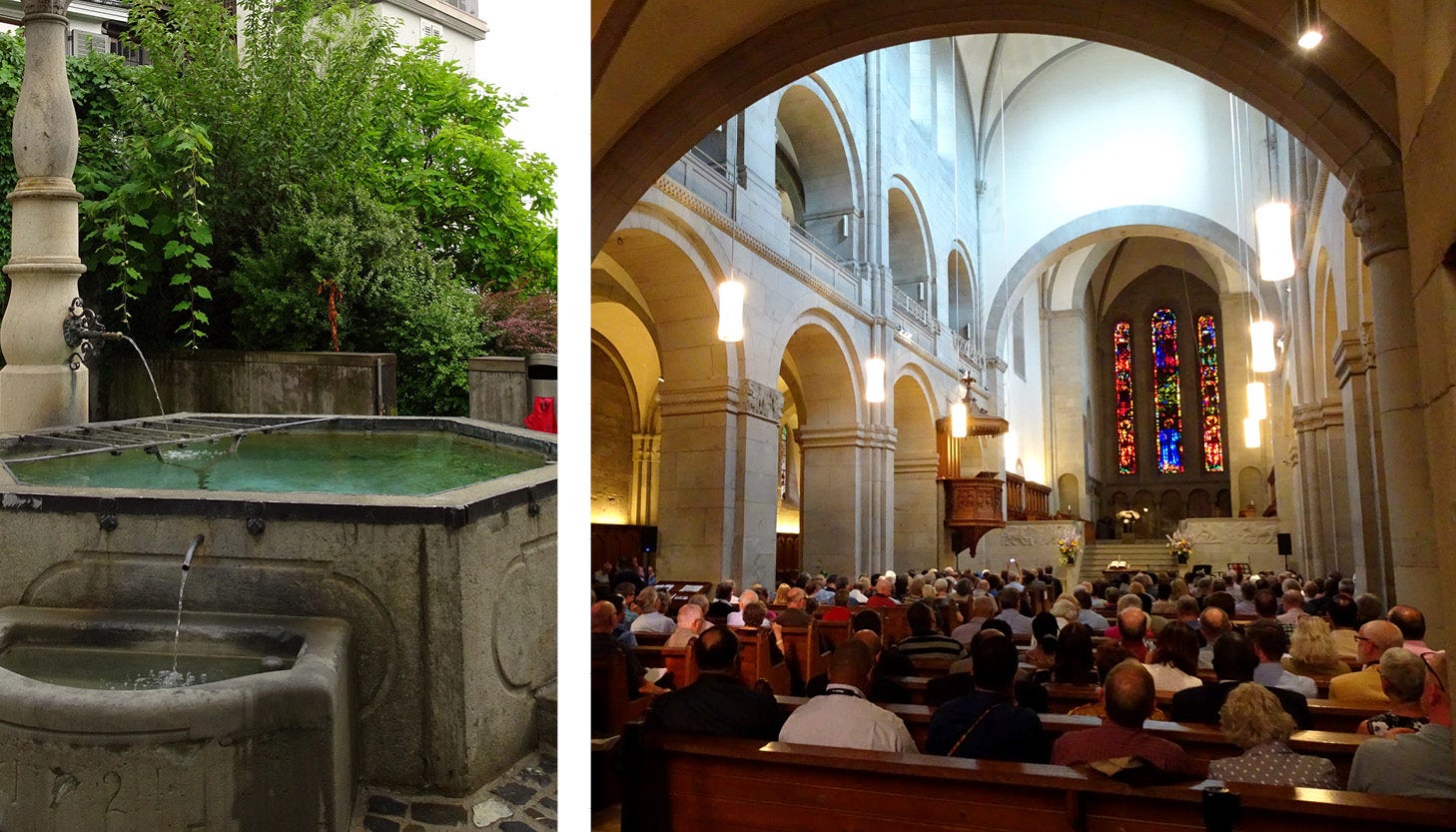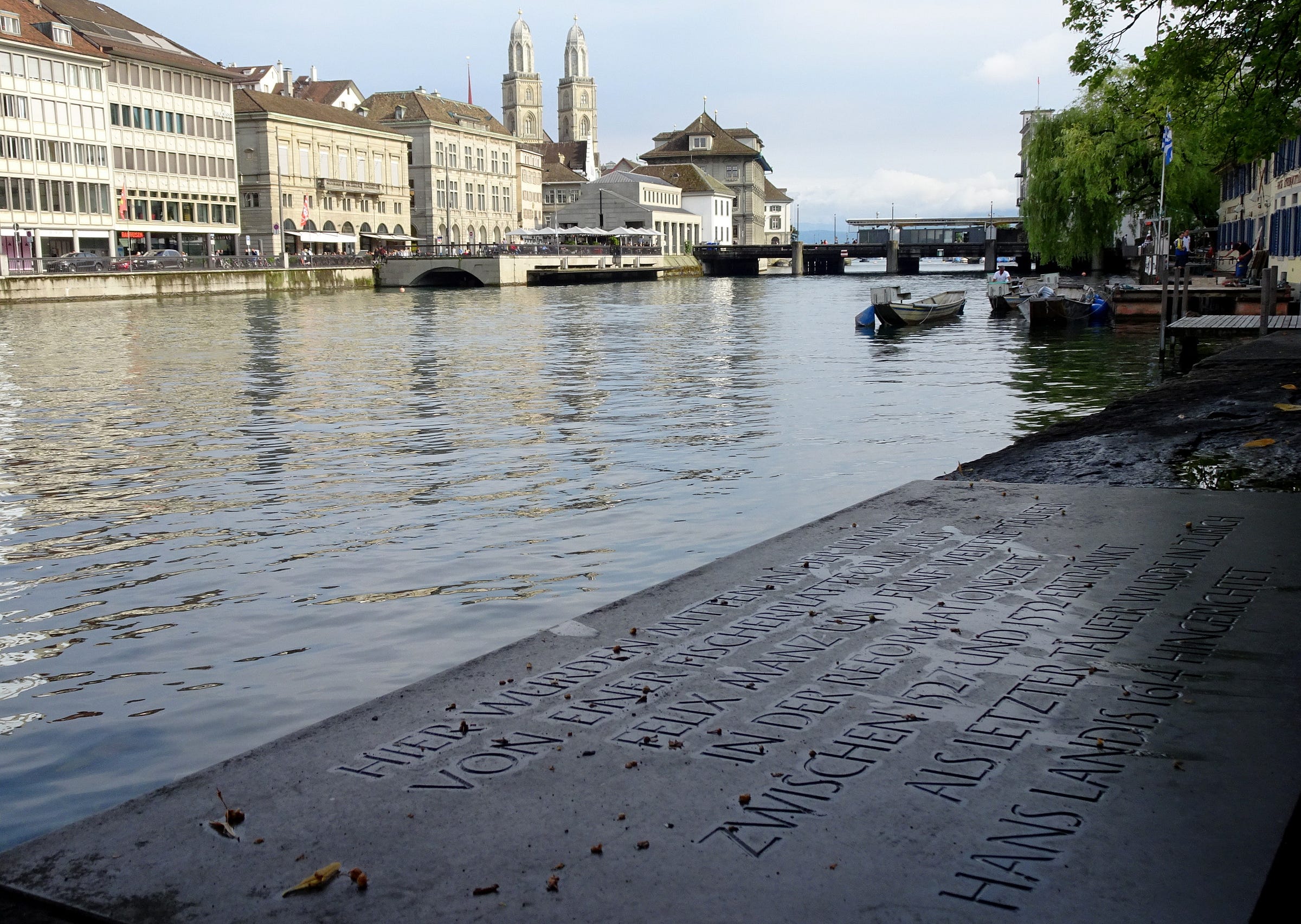Troubling the Water in Switzerland
On Jan. 21, 1525, a group of young men in Zürich, Switzerland, held a Bible study that soon shook up the religious and political powers of the city. But it wasn’t what they talked about in that home that caused a stir. It was what they did next out in public.
The group left the house of Felix Manz and walked over to a nearby public fountain. Conrad Grebel baptized George Blaurock, who then preceded to baptize Grebel and the others present. This marked the start of the Anabaptist movement with a belief in baptism after conversion instead of infant baptism. It also sparked religious and political persecution against this new movement.
The young men had been students of Huldrych Zwingli, perhaps the third most significant leader of the Protestant Reformation behind Martin Luther and John Calvin. Zwingli became a priest at the Grossmünster in Zürich in 1519, barely more than a year after Luther delivered his Ninety-Five Theses via nail mail. Within a few years, Zwingli would also spark controversy as he challenged Catholic Church teachings and practices, like arguing against fasting during Lent, celibacy of priests, and the uses of icons.
Zwingli’s reforms, however, didn’t occur just inside the massive sanctuary of the Grossmünster. He worked with the city council, often participating in public debates on theological issues to win permission to continue his teachings and reform the officially sanctioned practice of worship in the city. This led some of his young students — like Manz and Grebel — to push for even greater reforms in the church. Inspired by his way of reading the Bible, they came to reject infant baptism and eventually criticized Zwingli for not going further as he made concessions to the city council. As a result, they also began developing a philosophy rejecting the involvement of civil government in the affairs and theology of the church.
A series of public debates occurred in early 1525 as Manz, Grebel, and Blaurock (a former Catholic priest who had arrived in Zürich the previous year) argued against Zwingli and others. Throughout the debates, the city council sided with Zwingli, insisting people had an obligation to present their newborn infants for baptism. To resist now meant being guilty of not just religious heresy but also political subversion. A few days after that order, the group of radical former Zwingli students held their own baptism service in that public fountain less than a football field away from the Grossmünster.

The next month, the city council again demanded the baptism of newborn infants and ordered the arrest and fining of any who failed to comply. The next year as the public dispute continued, the city council ordered the execution of anyone who rebaptized someone. With church and state intermingling, a theological disagreement became a capital offense. The first punished under that edict was 28-year-old Manz.
On Jan. 5, 1527, city officials took Manz into the Limmat River that runs in front of the Grossmünster. One of Zwingli’s ministers rode in the boat to try and convince Manz to recant. With his hands bound on a pole behind his knees, he was tossed into the waters and drowned just a few hundred yards from where he had been baptized less than two years earlier.
Five more Anabaptists would later be killed in those same waters — and many others experienced persecution and martyrdom elsewhere. Grebel was imprisoned but escaped only to die from the plague. Blaurock was burned at the stake elsewhere. And theologian Balthasar Hubmaier, who had been tortured while imprisoned in Zürich after debating Zwingli on infant baptism, was burned in Vienna just three days before his wife was executed by drowning in the Danube River.
That history makes a contemporary religious-political dispute seem sadly ironic. A few hours away from Zürich, evangelical Christians are fighting for the right to hold baptisms in a public lake in Geneva (where Calvin ruled from in ways that mirrored Zwingli’s mix of church and state). This debate even came up last week during a session of the United Nations as a representative from the World Evangelical Alliance made the case for greater religious liberty rights in a nation with a reputation for neutrality (and chocolate, cheese, knives, and looted artwork).
So this issue of A Public Witness takes you inside the modern debate about public baptisms in Switzerland to consider what this can teach us about balancing church and state.

By the Waters of Geneva
“We call on Switzerland to remove illegitimate and disproportionate barriers to the exercise of religious freedom in public in the canton of Geneva,” said Markus Hofer, the World Evangelical Alliance’s UN Communications Officer in, ironically, the Geneva office.



